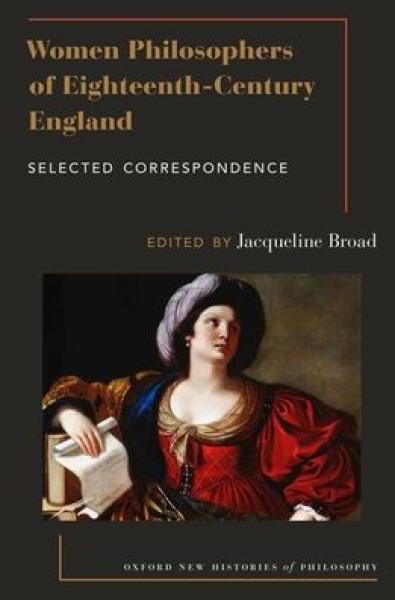Description
This is the second of two collections of correspondence written by early modern English women philosophers. In this volume, Jacqueline Broad presents letters from three influential thinkers of the eighteenth century: Mary Astell, Elizabeth Thomas, and Catharine Trotter Cockburn. Broad provides introductory essays for each figure and explanatory annotations to clarify unfamiliar language, content, and historical context for the modern reader. Her selections make available many letters that have never been published before or that live scattered in various archives, obscure manuscripts, and rare books. The discussions range in subject from moral theology and ethics to epistemology and metaphysics; they involve some well-known thinkers of the period, such as John Norris, George Hickes, Mary Chudleigh, John Locke, and Edmund Law. By centering epistolary correspondence, Broad's anthology works to reframe early modern philosophy, the foundation for so much of twentieth-century philosophy, as consisting of collaborative debates that women actively participated in and shaped. Together with its companion volume, Women Philosophers of Eighteenth-Century England: Selected Correspondence is an invaluable primary resource for students, scholars, and those undertaking further research in the history of women's contributions to the formation and development of early modern thought.
"This volume is an edited collection of the philosophical correspondences of three English women of the eighteenth century: Mary Astell, Elizabeth Thomas, and Catharine Trotter Cockburn. The selected correspondences include letters to and/or from John Norris, George Hickes, Mary Chudleigh, Richard Hemington, John Locke, Ann Hepburn Arbuthnot, and Edmund Law. Their epistolary exchanges range over a wide variety of philosophical subjects, from questions about the love of God and other people, to the causes of sensation in the mind, the metaphysical foundations of moral obligation, and the importance of independence of judgement in one's moral choices and actions. The volume includes a main introduction by the editor, which explains some of the key themes and developments in the eighteenth-century letters, including an increased awareness of other women's writings and of the concerns of women as a socio-political group. It is argued that if we look beyond printed treatises alone, to the content of these letters, it is possible to gain a fuller appreciation of women's involvement in philosophical debates of the 1690s and early 1700s. To situate each woman's thought in its historical-intellectual context, the volume includes original introductory essays for each principal figure, showing how her correspondences relate either to her contemporaries' ideas or to her own published views. The text also provides detailed scholarly annotations, explaining obscure philosophical ideas and archaic words and phrases in the letters. Among its critical apparatus, the volume also includes a note on the texts, a bibliography, and an index"--
"This volume is an edited collection of the philosophical correspondences of three English women of the eighteenth century: Mary Astell, Elizabeth Thomas, and Catharine Trotter Cockburn. The selected correspondences include letters to and/or from John Norris, George Hickes, Mary Chudleigh, Richard Hemington, John Locke, Ann Hepburn Arbuthnot, and Edmund Law. Their epistolary exchanges range over a wide variety of philosophical subjects, from questions about the love of God and other people, to the causes of sensation in the mind, the metaphysical foundations of moral obligation, and the importance of independence of judgement in one's moral choices and actions. The volume includes a main introduction by the editor, which explains some of the key themes and developments in the eighteenth-century letters, including an increased awareness of other women's writings and of the concerns of women as a socio-political group. It is argued that if we look beyond printed treatises alone, to the content of these letters, it is possible to gain a fuller appreciation of women's involvement in philosophical debates of the 1690s and early 1700s. To situate each woman's thought in its historical-intellectual context, the volume includes original introductory essays for each principal figure, showing how her correspondences relate either to her contemporaries' ideas or to her own published views. The text also provides detailed scholarly annotations, explaining obscure philosophical ideas and archaic words and phrases in the letters. Among its critical apparatus, the volume also includes a note on the texts, a bibliography, and an index"--
Last updated on
Product Details
- Oxford University Press, Brand
- Jun 3, 2020 Pub Date:
- 0197506992 ISBN-10:
- 9780197506998 ISBN-13:
- 304 Pages
- 9.1 in * 6.1 in * 0.7 in Dimensions:
- 1 lb Weight:




